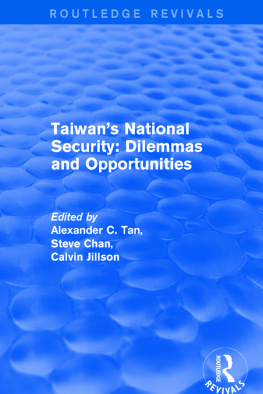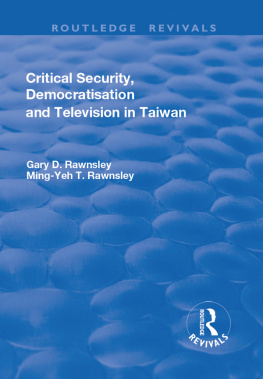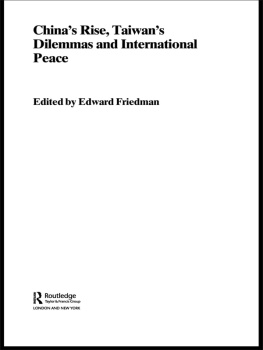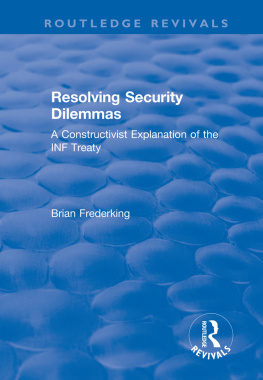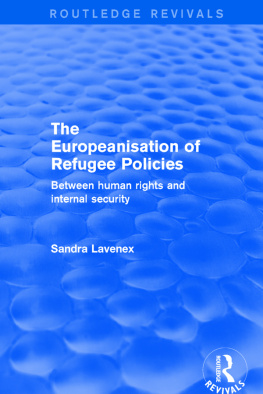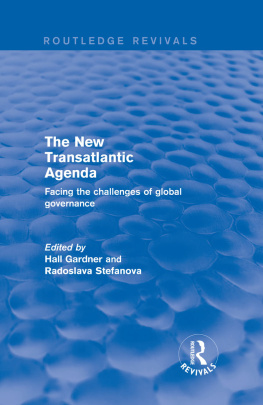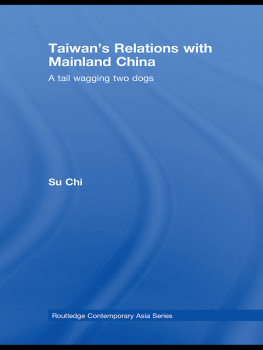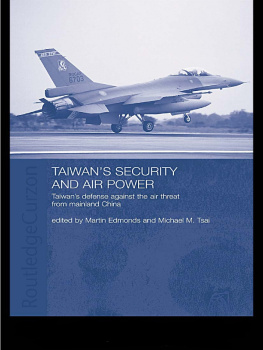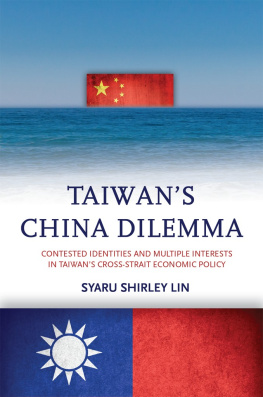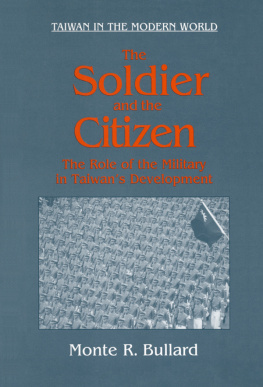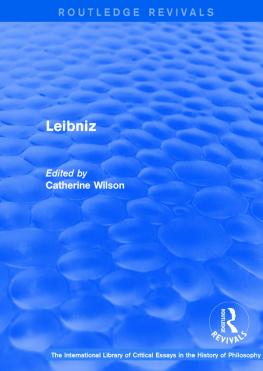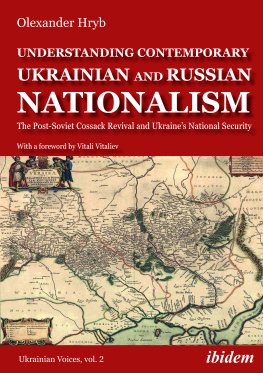TAIWANS NATIONAL SECURITY: DILEMMAS AND OPPORTUNITIES
Taiwans National Security: Dilemmas and Opportunities
Edited by
ALEXANDER C. TAN
University of North Texas
STEVE CHAN
University of Colorado
CALVIN JILLSON
Southern Methodist University
First published 2001 by Ashgate Publishing
Reissued 2018 by Routledge
2 Park Square, Milton Park, Abingdon, Oxon OX14 4RN
711 Third Avenue, New York, NY 10017, USA
Routledge is an imprint of the Taylor & Francis Group, an informa business
Copyright Alexander C. Tan, Steve Chan and Calvin Jillson 2001
All rights reserved. No part of this book may be reprinted or reproduced or utilised in any form or by any electronic, mechanical, or other means, now known or hereafter invented, including photocopying and recording, or in any information storage or retrieval system, without permission in writing from the publishers.
Notice:
Product or corporate names may be trademarks or registered trademarks, and are used only for identification and explanation without intent to infringe.
Publishers Note
The publisher has gone to great lengths to ensure the quality of this reprint but points out that some imperfections in the original copies may be apparent.
Disclaimer
The publisher has made every effort to trace copyright holders and welcomes correspondence from those they have been unable to contact.
A Library of Congress record exists under LC control number: 2001088769
ISBN 13: 978-1-138-72806-6 (hbk)
ISBN 13: 978-1-315-19066-2 (ebk)
Contents
Robert A. Scalapino
Cal Clark
Chia-lungLin
Bruce J. Dickson
Steve Chan
Alexander C. Tan with Scott Walker and Tsung-chi Yu
Steve Chan is Professor and Acting Chair at the Department of Political Science, University of Colorado at Boulder.
Cal Clark is Professor at the Department of Political Science, Auburn University.
Bruce J. Dickson is Associate Professor at the Department of Political Science and Director of the Gaston Sigur Center for East Asian Studies at George Washington University.
Calvin Jillson is Professor of Political Science and Director of the John G. Tower Center for Political Studies, Southern Methodist University.
Chia-lung Lin is Assistant Professor at the Department of Political Science, National Chung Cheng University in Taiwan.
Robert A. Scalapino is Robson Research Professor Emeritus at the Department of Political Science, University of California at Berkeley.
Alexander C. Tan is Assistant Professor at the Department of Political Science, University of North Texas.
Scott Walker, Ph.D candidate at the Department of Political Science, University of North Texas.
Tsung-chi Yu, Ph.D candidate at the Department of Political Science, University of North Texas.
ALEXANDER C. TAN, STEVE CHAN, and CALVIN JILLSON
Taiwans Security Dilemma
In the second half of the 20th century, the world witnessed the phenomenal transformation of East Asia from a collection of war-torn nation-states struggling to survive to dynamic economies that are among the worlds export powerhouses. As one of the tiger economies, Taiwans development is typical. From an economic backwater in the early 1950s, Taiwan created an economic miracle that is now one of the worlds economic and export dynamos. By the year 2000, Taiwan has become a full-fledged member of the worlds advanced industrial countries.
As Taiwans economy continues to evolve and develop, the 1990s also ushered in an era of unprecedented political transformation and development in the island. Through the process of political liberalization that began under the late President Chiang Ching-kuo, and later democratization by President Lee Teng-hui, Taiwan has become a model of peaceful political transformation. In 1996, the first democratic presidential election was conducted a first in the five thousand years of the history of any Chinese society. In 1997, constitutional amendments have streamlined Taiwans governmental structure to create a more competitive and efficient government. These reforms are seen by many as further steps toward a representative form of democracy. In May 2000, the transfer of power in the presidency from the Kuomintang to the Democratic Progressive Party heralded the consolidation of democracy in Taiwan.
These great strides in the past fifty years, nonetheless, belie the ever-present concern for national security and national survival that may undermine and dismantle all these achievements. In the 21st century, Taiwan is faced with a unique challenge in its attempt to achieve economic growth, stability, and political order. As part of a divided state, Taiwans position bears no similarity to any other nation in the world.
Unlike Germany and Korea where conditions are more favorable to the democratic country of the respective dyads, the Taiwan-China dyad is characterized by so much asymmetry in land, people, size of the communist neighbor. In geographic and demographic terms, China is a behemoth. In economic terms, China is a much bigger economy in absolute terms though Taiwan is stronger in per capita terms. Unfortunately for Taiwan, this glaring asymmetries extend to the political sphere as well. Taiwan is shut out from most significant international organizations like the United Nations. And as Bruce Dickson notes in his chapter in this book that while Taiwan has extensive economic and cultural ties with other countries, it only has formal political ties with 29 countries. To complicate the picture further, Taiwans security guarantor the United States does not even have formal diplomatic relations with it.
Indeed, these asymmetries and complications present significant challenges to Taiwans policymakers. And, in the face of Chinas growing power and its oft-stated threat of reunifying the island by force if Taiwan declares de jure independence, Taiwan threads a fine line as it asserts its rightful role in the region (and the world) and as it seeks to ensure security of the nation. These unique circumstances provide Taiwan with both dilemmas and opportunities as it joins the community of nations in the 21st century.
What are these dilemmas and opportunities in Taiwans national security? What does democratization of the polity mean for Taiwans national security? These are some of the questions that the chapters in this volume seek to examine in depth. To examine these questions, the approach we chose is decidedly an acknowledgment of the comprehensive nature of national security, that is, we seek to examine Taiwans economic security, national defense concerns, and the impact of domestic politics on its national security. By taking such an approach, we break down the artificial distinction between high politics and low politics. Indeed, the dictum that politics stops at the waters edge so to speak no longer applies when one discusses Taiwans national security. The blurring of these distinctions is made painfully clear by Taiwans predicament for clearly domestic political choices have international repercussions and more importantly to the survival of the state. Restructuring and structural adjustments of Taiwans economy does not become a simple economic decision but becomes entangled in the web of national security concern due to the continued fear of being absorbed into the PRCs political economy. And as the world has witnessed in the months leading to Taiwans first direct presidential election in 1996 and indeed in the presidential election of March 2000, laudable movement towards democratic consolidation in Taiwan but coupled with the complicated domestic politics associated with the rise of nativism and Taiwanese nationalism have undesired repercussions on Taiwans security and stability in the Asia-Pacific region.


